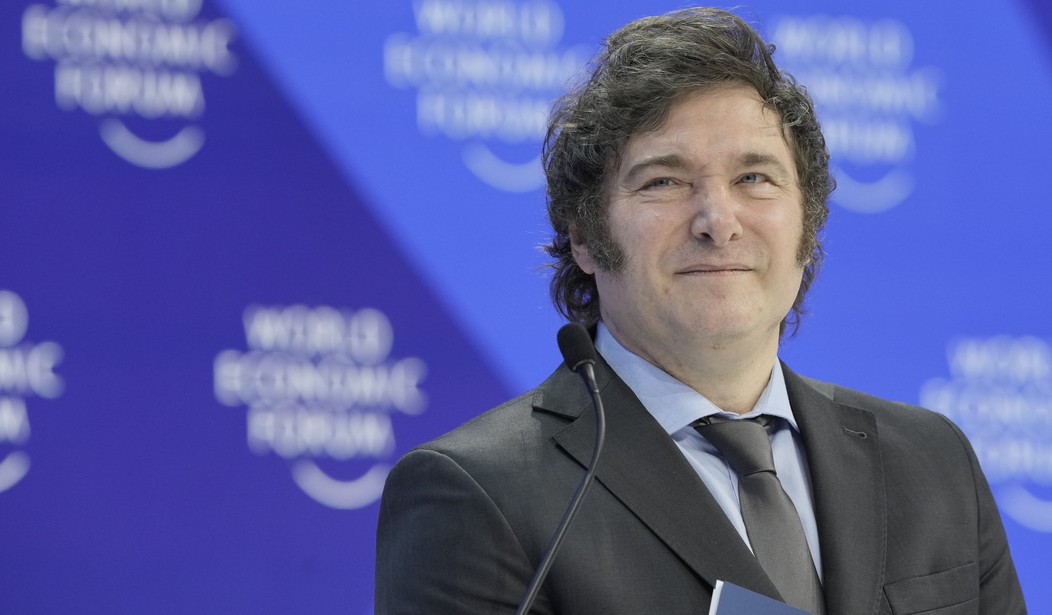There was a point where the United States was considered by both its denizens and foreigners to be the country where fortunes were made. To be sure, it still is, but our economic downturn has been so disastrous that starting anything seems nigh impossible to do thanks to the fact that you have to take out a mortgage to fill your gas tank.
Our inflation rate is currently sitting at 3.5 percent and has been rising for the past three months. Energy costs are up as well as shelter and food costs.
It's not a pretty picture, and it's one that has likely damned President Joe Biden's reelection chances.
But while our economy has taken a nasty dive, it's not the worst one we've ever seen, and moreover, it's not a nosedive we can't pull out of. There is hope. There is a strategy.
But to many, it would look like madness.
According to The Telegraph, we have a roadmap and it was written by someone that leftists and economists alike called a madman.
Javier Milei, Argentina's new President, has taken his country's inflation rate of 300 percent, and in the short time he's been in office, has brought it down to 11 percent.
And that's not all:
Last week, Milei announced that the country had recorded its first quarterly budget surplus since 2008, a modest 0.2pc of GDP, but still an astonishing achievement in such a short space of time, especially for a country that has run deficits for 113 of the last 123 years.
Then, earlier this week, the central bank, which Milei has not yet gotten around to abolishing as he pledged, cut interest rates for the third time in three weeks. While they are still at an eye-watering 50pc, that will start to feed through into the economy very soon. Investors have started to notice.
The peso spent Q-1 being the best-performing currency in the world and bond markets rallying, investors are starting to take a serious interest in the country.
What did he do?
He effectively took a huge wrecking ball to his own government. As the Telegraph lays out, Milei began destroying departments left and right, and he's not even done yet:
First, even without a majority in parliament, he has been ruthless. Whole government departments have been closed down overnight, regardless of the immediate consequences. The Ministry of Culture was axed, so was the anti-discrimination agency, and the state-owned news service. Only last month, he unveiled plans to fire another 70,000 state employees.
Milei hasn’t attempted to cut gradually, to control budgets, or to ease people out with early retirement, or hiring freezes. Instead, he has, as promised, taken a ‘chainsaw’ to the machinery of the state, yielding huge savings in the process.
He then took restrictions and regulations off businesses in Argentina and decreased subsidies and despite there being a slight surge in inflation, the quick turnaround has been evident. It was a slight moment of pain followed by a not-yet-capped success.
The problem in Argentina before Milei arrived looks very familiar as written by the Telegraph:
Governments are hooked on subsidies and price controls, trying to buy their way out of every challenge with higher spending. Deficits are allowed to rise relentlessly, with no meaningful plan for ever bringing them down again. A corrupt, crony capitalism is allowed to flourish, killing competition.
In order to get out of this problem we have, perhaps we need a little madness.
As I've written before, Americans are going to need an element of bravery that likely won't come until our backs are severely against a wall, but the faster we embrace the Javier Milei method of turning an economy around, the better. It's going to involve some very unpopular decisions from Washington that will have the left apoplectic and likely rioting in the streets. It will involve destroying entire government agencies to save billions and firing thousands of government workers.
But all of this pain will be temporary. The benefits will be impossible to deny.
This may seem like radicalism, but for Americans, this should be as easy as breathing. We learned long ago that government isn't the solution, but the problem. Our founding principles revolved around that idea.
(READ: The Fear of Freedom Is Real)
The key is to return to that idea of freedom from government, which will result in an economic boom like the kind seen in Argentina.
"Freedom implies taking risks," Milei once said during an interview.
But the risk has already been taken. Milei did it in Argentina. Now the path is clear.
The greater risk is not taking that path.














